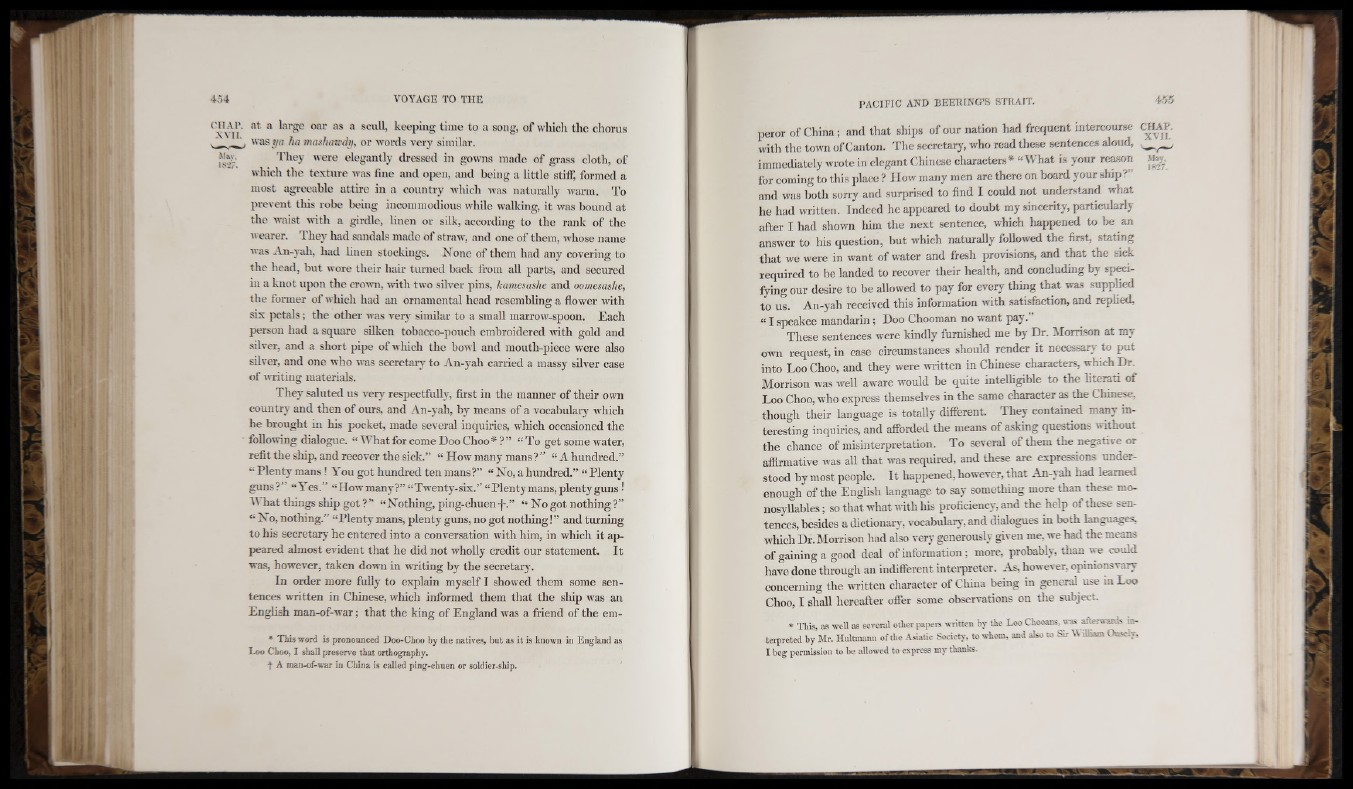
C H A r .
XVII.
Mav.
K'i'.’r.
at a large oar as a scull, keeping time to a song, of which the chorus
wus f/i7 ha masharvdy, or words very similar.
They were elegantly dressed in gowns made of grass cloth, of
which the texture was tine and open, and being a little stilt; formed a
most agreeable attire in a country which was naturally warm. To
prevent this robe being ineommodions while walking, it was bound at
the waist with a girdle, linen or silk, according to the rank of the
wearer. They had sandals made of straw, and one of them, whose name
was An-vidi, had linen stockings. None of them had any covering to
the head, but wore their hair turned back from all parts, and secured
in a knot upon the crown, with two silver pins, kamesashc and oomesashe,
the former of which had an ornamental head resembling a flower with
six petals: the other was very similar to a small marrow-spoon. Each
person had a square silken tobacco-pouch embroidered with gold and
silver, and a short pipe of which the bowl and mouth-piece were also
silver, and one who was secretary to An-yah carried a massy silver case
of writing materials.
They saluted us very respectfully, first in the manner of their own
country and then of ours, and An-yah, by means of a vocabulary which
he brought in his pocket, made several inquiries, which occasioned the
following dialogue. “ AVhat for come Doo Choo * ? ” “ To get some water,
refit the ship, and recover the sick.” “ How many mans?” “ A hundred.”
“ Plenty mans ! You got hundred ten mans?” “ No, a hundred.” “ Plenty
guns?” “Yes." “How many?” “Twenty-six.” “Plenty mans, plenty guns •'
AA"hat things ship got?" “Nothing, ping-chuen f . ” “ No got nothing?”
“ No, nothing.” “Plenty mans, plenty guns, no got nothing! ” and turning
to his secretary he entered into a conversation with him, in which it appeared
almost evident that he did not wholly credit our statement. It
was, however, taken down in writing by the secretary.
In order more fully to explain myself I showed them some sentences
WTitten in Chinese, which informed them that the ship was an
EngUsh man-of-war; that the king of England was a friend of the em*
This word U pronounced Doo-Choo by the native«, but as it is known in England as
Loo Choo, I shall preserve that orthography.
f A man-of-war in China is called ping-chuen or soldier-ship.
peror of China; and that ships of our nation had frequent intercourse CU AP
with the town of Canton. The secretary, who read these sentences aloud, ,
immediately wrote in elegant Chinese characters* “What is your reason
.\fav.
1827.
for coming to this place ? J low many men are there on board your ship
and was both sorry and surprised to find I could not understand what
he had written. Indeed he appeared to doubt my sincerity, partitmlarly
after I had shown him the next sentence, which happened to be an
answer to his question, but which naturally followed the first, stating
that we were in want of water and fresh provisions, and that the sick
required to be landed to recover their health, and concluding by specifying
our desire to be allowed to pay for every thing that was suppUed
to us. An-yah received this information with satisfaction, and replied,
“ I speakee mandarin; Doo Chooman no want pay.”
These sentences were kindly furnished me by Dr. Morrison at my
own request, in case circumstances should render it necessary to put
into Loo Choo, and they were wiitten in Chinese characters, which Dr.
Morrison was well aware would be quite intelligible to the literati of
Loo Choo, who express themselves in the same character as the Chinese,
though their language is totally different. They contained many interesting
inquiries, and afforded the means of asking questions without
the chance of misinterpretation. To several of them the negative or
affirmative was all that was reqifired, and these are expressions understood
by most people. It happened, however, that .An-yah had learned
enough of the English language to say something more than these monosyllables;
so that what with his proficiency, and the help ofthese sentences,
besides a dictionary, vocabulary/ and dialogues in both languages,
which Dr. Morrison had also very generously given me. we had the means
of gaining a good deal of information : more, probably, than we coidd
have done through an indifferent interpreter. -As, however, opinionsvary
concerning the written character of Cliina being in general use in Loo
Choo, I shall herciffter oiler some observations on the subject.
* This, as well as several other papers written by the Loo Chooims. «tis aRerw-ATAus m-
terpreted hy Ur. Hultiiiann of the Asiatic Society, to whom- and to Sir M iUiain CWIy-
I beg permission to be allowed to express my thanks.
1/ ll